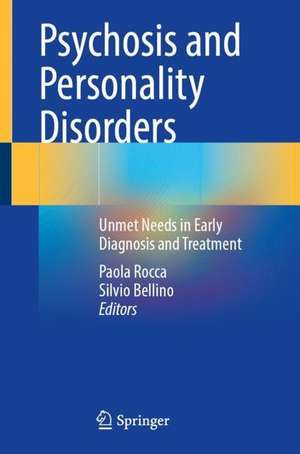Psychosis and Personality Disorders: Unmet Needs in Early Diagnosis and Treatment
Editat de Paola Rocca, Silvio Bellinoen Limba Engleză Hardback – 27 sep 2022
| Toate formatele și edițiile | Preț | Express |
|---|---|---|
| Paperback (1) | 636.11 lei 38-44 zile | |
| Springer International Publishing – 28 sep 2023 | 636.11 lei 38-44 zile | |
| Hardback (1) | 650.34 lei 38-44 zile | |
| Springer International Publishing – 27 sep 2022 | 650.34 lei 38-44 zile |
Preț: 650.34 lei
Preț vechi: 684.57 lei
-5% Nou
Puncte Express: 976
Preț estimativ în valută:
124.48€ • 135.26$ • 104.63£
124.48€ • 135.26$ • 104.63£
Carte tipărită la comandă
Livrare economică 17-23 aprilie
Preluare comenzi: 021 569.72.76
Specificații
ISBN-13: 9783031090578
ISBN-10: 3031090578
Pagini: 161
Ilustrații: V, 161 p. 4 illus., 3 illus. in color.
Dimensiuni: 155 x 235 x 15 mm
Greutate: 0.43 kg
Ediția:1st ed. 2022
Editura: Springer International Publishing
Colecția Springer
Locul publicării:Cham, Switzerland
ISBN-10: 3031090578
Pagini: 161
Ilustrații: V, 161 p. 4 illus., 3 illus. in color.
Dimensiuni: 155 x 235 x 15 mm
Greutate: 0.43 kg
Ediția:1st ed. 2022
Editura: Springer International Publishing
Colecția Springer
Locul publicării:Cham, Switzerland
Cuprins
Chapter 1) Trajectories toward bipolar disorder or schizophrenia in FEP and high-risk mental state.- Chapter 2) New strategies to improve cognitive symptom domain in the treatment of schizophrenia.- Chapter 3) Psychotic disorders and substance abuse comorbidity: characteristics and treatment.- Chapter 4) Recovery from psychosis: definition, paradoxes, and clinical implications.- Chapter 5) Cluster A personality disorders and potential for early intervention in psychosis: challenges and opportunities.- Chapter 6) Risk factors of early onset of borderline personality disorder: a conceptual model.- Chapter 7) Clinical evaluation and intervention of emerging psychosis: a mentalization-informed perspective.- Chapter 8) Personality disorders and suicidality.
Notă biografică
Paola Rocca, MD, is Full Professor of Psychiatry at the University of Turin. She is the Chief of the Center for Treatment-Resistant Psychotic Disorders, and she set up the Center for Cognitive Rehabilitation at the Department of Neurosciences, Turin. She has been the Vice Director of Scientific Research and currently she is the Vice Director of Quality at the Department of Neuroscience, "Rita Levi Montalcini", she is also a member of the Research Commission of the Medical School of the University of Turin, the Coordinator of the Neuroimaging Committee, and the responsible for the Neuroimaging Center at the University of Turin (NIT). She is a member of the steering committee of the Italian Network for Research on Psychoses (NIRP) and a councilor on the executive committee of the Italian Society of Psychopathology. She is the Coordinator of the schizophrenia research section at the Department of Mental Health, Turin. Her interests in clinical psychiatry research on schizophrenia include the study and classification of schizophrenia according to different patterns of symptoms/cognitive deficits; evaluation of depressive symptoms in schizophrenia using specific standardized scales; study of correlation between depressive symptoms and cognitive functions/functional outcome, subjective and objective quality of life and coping; study of delusion and cognitive pattern in acute and stable patients with schizophrenia, disorganized and paranoid type; social cognition: clinical, neuropsychological and neurobiological aspects; the impact of new and old antipsychotic drugs on cognitive functioning. Her research in the field of biological psychiatry is mainly focused on the analysis (using fMRI techniques and high-resolution EEG) of brain activation of specific areas during particular cognitive tasks in patients with schizophrenia. Her research has led to more than 100 publications in international high impact factor journals as well as numerous book chapters.
Silvio Bellino graduated in Medicine and specialized in Psychiatry at the University of Turin, Italy. He became a Researcher of Psychiatry at the Department of Neuroscience in October 2001 and was made Head of the Centre for Personality Disorders in January 2007. Currently Associate Professor of Psychiatry, he teaches psychiatry at the School of Medicine and at the University of Turin’s Schools of Medical Specialization. His studies focused on psychopathology and pharmacotherapy of personality disorders, mood and anxiety disorders, and on interpersonal psychotherapy of major depression and personality disorders. He presented his research findings at Italian and International congresses and published numerous articles in indexed journals. He has been the Editor-in-Chief of Current Psychopharmacology since 2011. In 2012 he became President of the Italian Society of Interpersonal Psychotherapy.
Textul de pe ultima copertă
This volume offers a detailed and up-to-date analysis of the unmet needs of patients with psychoses and personality disorders. These include the needs associated with early detection of ultra-high-risk populations and first-episode psychosis; recognition of the trajectories of bipolar disorder and schizophrenia, recovery, early intervention, such as the use of LAIs, the conundrum of differential diagnosis in various personality disorders, and unsatisfactory quality of life, even in the presence of symptom control.
Intended for clinical psychiatrists and other practitioners interested in mental health, this book helps them to manage the challenges of the diagnostic uncertainty in first-episode psychosis and timely interventions, since the earlier diagnosis is confirmed, the sooner multidisciplinary treatment can be implemented and plans for psychoeducation, and relapse prevention drawn up.
Caracteristici
Explains how to intercept the transition from discomfort to the first episode psychosis Presents trajectories versus bipolar or schizophrenia in patients with first episode psychosis Elaborates on advantages and prognostic challenges of early intervention in psychoses and personality disorders
